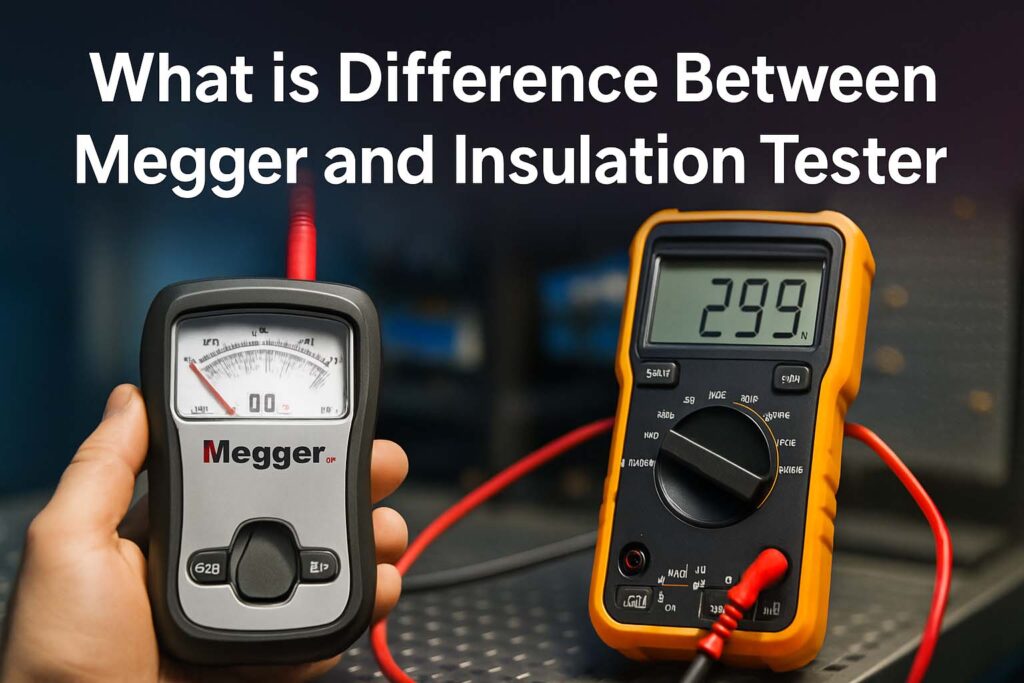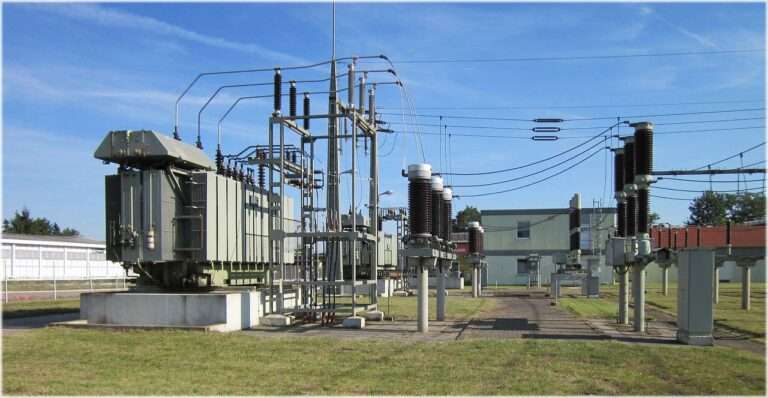What is Difference Between Megger and Insulation Tester
Understanding the difference between megger and insulation tester is essential for electricians, engineers, and professionals in the electrical industry. Both tools are widely used to assess the insulation quality of electrical circuits, but their application, design, and accuracy differ significantly.

While many people use the terms interchangeably, there are technical differences that make them suitable for different tasks.
Understanding the Basics of Megger and Insulation Tester
Both megger and insulation tester are used to measure insulation resistance, a critical parameter in electrical installations. High insulation resistance ensures that electrical current does not leak from conductors to other parts of the system.
A megger is actually a brand name that has become synonymous with high-voltage insulation resistance testers. An insulation tester, on the other hand, is a general term for devices used to perform insulation tests, regardless of the brand.
Think of it this way: all meggers are insulation testers, but not all insulation testers are meggers.
Know more about Best Megger Insulation Tester 10kV
Key Differences Between Megger and Insulation Tester
Let’s dive deeper into the technical differences between the two.
1. Voltage Output
One major difference is the test voltage range.
| Feature | Megger | Insulation Tester |
|---|---|---|
| Voltage Range | 250V to 10,000V | 250V to 1,000V |
| Usage | Industrial High Voltage | General Low to Medium Voltage |
Meggers are used for high-voltage insulation testing, especially in power plants, substations, and large motors. Insulation testers are mostly used for testing low-voltage systems like residential wiring or small equipment.
2. Application Scope
Megger and insulation tester are used for different types of installations.
- Megger is ideal for critical systems, such as transformers, high-voltage cables, and generators.
- Insulation testers are more suited for routine testing of circuits in buildings, consumer electronics, and small machines.
3. Accuracy and Reliability
A megger is built for durability, precision, and extended use in industrial environments. It provides more reliable readings over longer distances or across large coils and cables.
An insulation tester may give slightly less accurate results in such demanding environments, but it works perfectly for regular testing tasks.
Know more about How to Use Megger Insulation Tester 5000V
4. Features and Functionality
Modern meggers often come with multiple features like:
- Polarization Index (PI)
- Dielectric Absorption Ratio (DAR)
- Guard terminals to eliminate surface leakage
- Timed testing and automatic shutdown
While some high-end insulation testers may offer a few of these, most basic testers are limited to simple insulation resistance measurements.
Megger: A Closer Look
The word “Megger” is a combination of “mega” (million) and “ohm” (unit of resistance). It was first introduced by the company Megger Group Limited. Today, the term refers to high-end insulation testing devices with voltage outputs of up to 10kV.
A megger generates a high DC voltage internally and applies it to the equipment under test. It measures the resistance by checking how much current leaks through the insulation.
Technicians prefer megger devices for high-voltage industrial systems. They are especially helpful during preventive maintenance of switchgear, cables, and motors.
Know more about How to Use Megger Insulation Tester 1000V
Insulation Tester: A Practical Tool
An insulation tester is more of a category than a specific device. It can range from simple handheld tools to more sophisticated instruments.
Most insulation testers generate voltages between 250V and 1,000V, which is sufficient for household appliances and standard electrical circuits.
These testers are common in electrician kits and are ideal for tasks like checking wiring after installation or repair. They are user-friendly, lightweight, and budget-friendly.
Similarities Between Megger and Insulation Tester
Despite their differences, megger and insulation tester have several things in common.
- Both measure resistance in mega-ohms (MΩ)
- Both are used to ensure safety and reliability in electrical systems
- Both detect insulation breakdown, leakage current, or moisture in cables
Their function is essentially the same — but the environment and voltage requirements define which one you should use.
When to Use Megger vs Insulation Tester
Choosing between a megger and an insulation tester depends on the application.
- Use a megger when dealing with high-voltage systems, motors above 100HP, or cable runs over long distances.
- Use an insulation tester for low-voltage panels, short wiring circuits, and small equipment testing.
This decision is based on voltage, system criticality, and safety requirements.
Know more about How Does a Megger Insulation Tester Work
Importance of Insulation Testing
Insulation resistance testing is a preventive maintenance strategy that prevents electrical failures, reduces fire risk, and extends equipment life.
Whether you are using a megger or a general insulation tester, you’re identifying insulation degradation caused by:
- Heat
- Moisture
- Vibration
- Chemical exposure
- Mechanical stress
Routine insulation testing can help detect problems before they cause failure.
Common Test Procedures
To perform an insulation resistance test using either a megger or insulation tester, follow these general steps:
- De-energize the circuit
- Disconnect the equipment from the system
- Connect the test leads properly
- Select appropriate test voltage
- Press the test button and observe the resistance value
- Compare the reading with standard insulation resistance values
Higher resistance is better. A reading below 1 MΩ usually means the insulation is compromised.
Know more about Protection Schemes for Alternator
Safety Considerations
Both meggers and insulation testers generate high voltage during testing. Always wear proper PPE (Personal Protective Equipment), including insulated gloves and goggles.
Do not perform insulation tests on live circuits. Follow lockout/tagout procedures to ensure complete safety.
Which One Should You Buy?
Here are a few buying tips depending on your needs:
| Requirement | Suggested Tool |
|---|---|
| Industrial Testing | Megger |
| Residential Wiring | Insulation Tester |
| High Accuracy | Megger |
| Budget-Friendly | Insulation Tester |
| Testing Transformers | Megger |
| General Cable Testing | Insulation Tester |
If you work in both residential and industrial environments, you might want to invest in both tools. Some brands also offer hybrid devices with dual-voltage features.
Popular Brands to Consider
Some top-rated manufacturers for megger and insulation tester include:
- Megger
- Fluke
- Kyoritsu
- Hioki
- Extech
- Chauvin Arnoux
Each brand offers a variety of models tailored for specific testing needs. Look for features like auto-ranging, backlit displays, memory storage, and rechargeable batteries when buying.
Final Thoughts on Megger and Insulation Tester
Understanding the difference between megger and insulation tester can help you make better decisions in the field. Both tools play an important role in ensuring electrical systems are safe, efficient, and long-lasting.
A megger is best for industrial, high-voltage, and critical testing. An insulation tester is more practical for everyday tasks.
Follow Us on Social:
Subscribe our Newsletter on Electrical Insights for latest updates from Electrical Engineering Hub
#Megger, #InsulationTester, #ElectricalTesting, #ElectricalMaintenance, #InsulationResistance, #MeggerTest, #ElectricalSafety, #TestEquipment, #ElectricalEngineering, #HVTesting, #InsulationTest, #MeggerVsInsulationTester, #IndustrialTesting, #DielectricTest, #EngineeringTools






